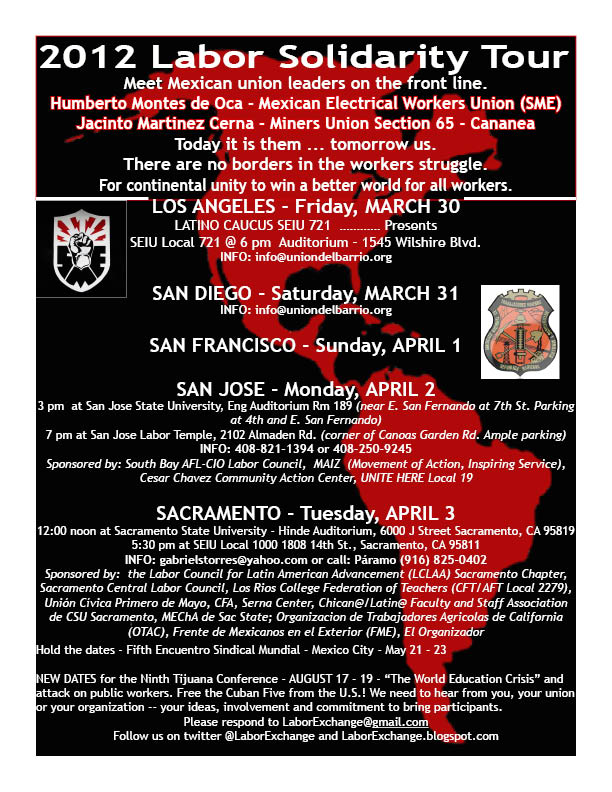Saturday, August 18, 2012
Wednesday, August 15, 2012
Monday, July 16, 2012
Saturday, May 5, 2012
Sunday, March 25, 2012
Friday, March 16, 2012
 |
| Tour begins March 30 in Los Angeles; March 31 in San Diego; April 1, San Francisco; April 2 San Jose; April 3 Sacramento |
Monday, January 30, 2012
Forum on ALBA in CHICAGO
The U.S./Cuba Labor Exchange conferences in Tijuana, Mexico focus on theses themes specifically related to workers. Please welcome Cuban Ambassador Bolanos at this excellent and informative forum!
Forum on ALBA:
Latin America and the Continental Integration of the Peoples
Forum on ALBA:
Latin America and the Continental Integration of the Peoples
The achievements of ALBA-TCP (alba-tcp.org) and the integration of the continental social movements
Thursday, March 22 and Friday, March 23
5:00-8:00pm DePaul University
Schmitt Academic Center (SAC) Room 154
2320 N. Kenmore, Chicago
5:00-8:00pm DePaul University
Schmitt Academic Center (SAC) Room 154
2320 N. Kenmore, Chicago
Thursday, March 22:
Conference on the Social Movements of the ALBA-TCP Nations
Conference on the Social Movements of the ALBA-TCP Nations
Luther Castillo, Spokesperson for the Honduran People’s Front for National Resistance; co-coordinator of Cuba’s Latin American School of Medicine's international team of physicians working in Haiti after the earthquake
Rummie Quintero, LGBT activist, Venezuela
José Aguilar, Free Software Movement, Venezuela
Amenothep Zambrano, Executive Secretary of ALBA-TCP
Jose Pertierra, represents Venezuelan government in the case to extradite Luis Posada Carriles
Friday, March 23:
Conference with Diplomats of the ALBA-TCP Nations
Francisco Campbell Hooker, Nicaragua Ambassador in Washington
Jorge Bolaños Suárez, Chief of the Cuban Interests Section in Washington
Angelo Rivero, Presiding Officer of the Embassy of Venezuela in Washington
Freddy Bersatti Tudela, Presiding Officer of the Embassy of the Plurinational State of Bolivia in Washington
Amenothep Zambrano, Executive Secretary of ALBA-TCP
Organized by: DePaul University, General Consulate of Venezuela in Chicago,
Chicago Committee to Free the Cuban 5, La Voz de los de Abajo.
For more information: Jesús Rodríguez Espinoza ; Stan Smith, uscubachi@yahoo.com, 773-376-7521
What is ALBA?
The Bolivarian Alliance for the Peoples of Our America - Trade Treaty of the People (ALBA-TCP) presently consists of Venezuela, Cuba, Bolivia, Ecuador, Dominica, St. Vincent and Grenadines, Antigua and Barbuda, and Nicaragua.
“ALBA’s fight is for a second true independence for Latin America and Caribbean; to free ourselves from poverty and illiteracy and achieve development for our people,” explains Amenothep Zambrano, Executive Secretary of ALBA.
ALBA is a trade agreement that mutually benefits all parties based on the strengths and weaknesses of each of the members. It builds Latin American unity and solidarity through mutual economic development, fair trade, joint development projects and South-South coordination. This is a radical break neo-colonial history based upon imperial exploitation, the fiction of a free market, and domination by the United States.
Why was ALBA created?
ALBA was created as a direct response to the attempt by the United States to impose the Free Trade Area of the Americas treaty on the entire region of Latin America and the Caribbean. Implementation of the FTAA would have imposed intensified neo-liberal economic policies, increasing crushing levels of poverty, unemployment and foreign-imposed debt.
Hugo Chávez and Fidel Castro formally created ALBA on Dec. 14, 2004, at the celebration of the 180th anniversary of the victory of Ayacucho, the day Simón Bolívar’s army won independence from Spain
The need for alliances such as ALBA is demonstrated by the more than 50-year-long war waged by the United States against Cuba, the 2002 failed U.S.-coup attempt against Venezuelan President Hugo Chavez, the 2009 U.S. coup against the democratically-elected pro-ALBA president of Honduras, Manuel Zelaya, the 7 new U.S. military bases in Colombia, and the failed U.S. coups in Bolivia and Ecuador. ALBA countries have recently condemned foreign intervention in Libya and Syria, and have recently strengthened their ties with Iran.
What Has ALBA Accomplished?
ALBA initiatives include: the ALBA Bank, funding the different development projects in their countries, working towards independence from the International Monetary Fund, the World Bank and other exploiting global institutions; the creation of 12 public companies to strengthen national economies in agriculture, infrastructure, telecommunications, industrial supplies and cement production; PetroCaribe, which greatly increases access to energy resources; and a diverse array of health and education programs.
ALBA’s social achievements include the elimination of poverty for 11 million people in only five years, through free universal education, food programs, and health programs. Unemployment has dropped to 8.7%, lower than in the U.S. Literacy rates have risen from 84% to 96%; now Bolivia and Nicaragua join Cuba and Venezuela in being free of illiteracy. Infant mortality rates have been reduced by 32%; life expectancy increased to 73 years. 1,899.808 people have had their vision restored or improved through Mision Milagro. 2,294,666 handicapped persons have received health care service for their problems. Hundreds of their countries students are enrolled in ALBA’s Latin American School of Medicine to develop still more critically-needed medical workers.
Subscribe to:
Comments (Atom)




